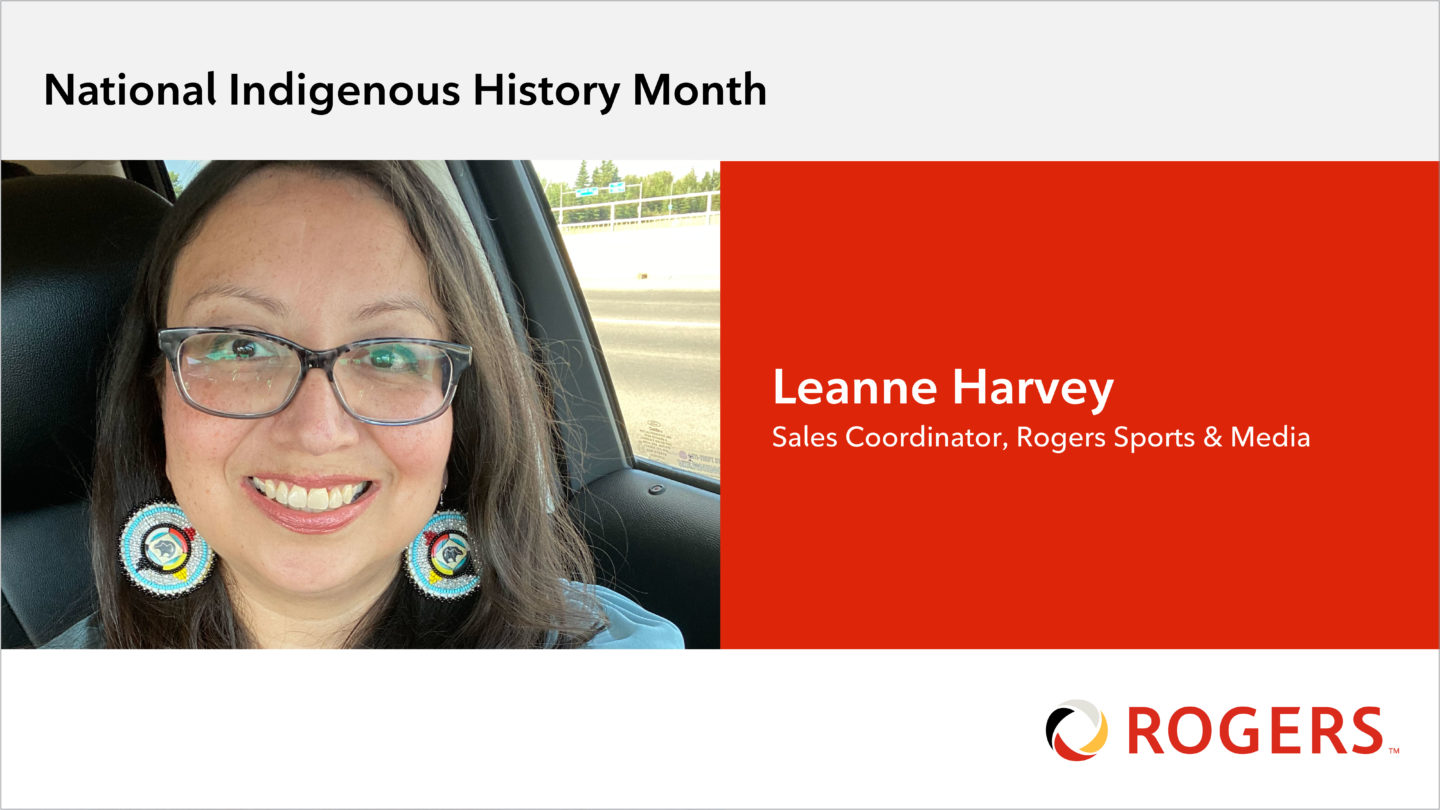National Indigenous History Month – Leanne Harvey shares how she’s celebrating this month by reclaiming her Anishinabe way of life

Throughout National Indigenous History month we’ll be spotlighting personal and inspiring stories from a few Indigenous team members. Here’s Leanne’s story.
National Indigenous History Month is a dedicated time each year for learning and acknowledging the distinct heritage, languages, cultural practices, and spiritual beliefs of Indigenous people. In honour of National Indigenous History Month, a few Indigenous team members will be sharing their stories.
Leanne Harvey is a proud Anishinabe woman and has worked as a Sales Coordinator with Rogers Sports and Media with the Northern Alberta Sales Team in Edmonton for the past eight years. As the daughter and granddaughter of Residential School survivors from Minegoziibe Anishinabe (Pine Creek First Nation) located on treaty four territory in the province of Manitoba, Leanne recognizes she is here because of their strength and resilience. Here’s Leanne’s story.
What are some traditional teachings that have been passed down to you?
I have traditions that are broadly inspired by Christian-European practice. Birthday parties, graduation parties, carving a turkey at Thanksgiving, opening presents after midnight mass, and shooting off fireworks on New Years Eve. However, I recently learned that this dark story I always heard of was true, that between 1831 and 1996, the Canadian Government and the Church’s operated residential schools throughout Canada. The main objective was to systemically erase the cultural identities of Indigenous children through assimilation. Unfortunately, many of the sacred practices, languages and spiritualities of Indigenous Peoples, my people in Canada were wiped out. The ones that weren’t were outlawed or abolished. The children learned to be ashamed of their identity. It has been a struggle for many individuals and communities ever since to relearn, regain, and revitalize what was taken.
Indigenous people are story tellers. I treasure the stories that come along with baking Bannock (leeban) in the kitchen with my Mama along with a beautiful quilt made from scraps of fabric from my late Grannys work as a seamstress, now known as my healing blanket. Also, I hold on to a leather pencil case with my name beaded on it, and ceramics made by my late Nan at her ceramic hut. I hold these memories close to my heart and hear the laughter. I never knew why I held on to these things all these years but now I know why. As I work on reclaiming my Indigeneity this reminds me of where I come from and gives me strength as I continue my journey. My hope is to pass on these stories and many more Indigenous traditions down to my children and grandchildren for generations to come.
What does National Indigenous History Month mean to you?
Indigenous History Month means living my truth, finding the courage to use my voice and speaking for those who couldn’t. It has been an exhausting journey living in two different worlds where I felt I never belonged. It’s time for me to take off the colonial lens and put on my cultural lens. It’s a time for me to learn more about the history of Indigenous people, spend time immersed in Indigenous culture, and acknowledge the impact of what the Indian Act and the Residential School system had on Indigenous communities and their culture. This is an opportunity for me to help others in taking reconciliACTION. But most of all, its time to celebrate us, Indigenous Peoples.
How do you celebrate National Indigenous History Month?
We as Indigenous Peoples need to celebrate our history because doing so helps to stop the loss of our culture. Celebrating our history is revitalizing our pride in being Indigenous and our existence. Growing up, sacred practices, languages and spiritualities of Indigenous Peoples in Canada were outlawed or abolished. National Indigenous History Month is vital to preserve our Indigenous culture and work to reclaim stolen Indigenous identities.
There are so many ways to celebrate. Right now, I’m learning to speak Ojibway, reading books, watching Indigenous media, listening to Podcasts, music, and plan to attend a few events in Edmonton and surrounding areas. I celebrate for my children, grandchildren, and all Indigenous children to live better life. A future where they do not have to choose only one way, leave their circle, loose their voices, be judged, or be misunderstood. Ultimately, they can live their truth.
What is something you want your Rogers team members and allies of the Indigenous community to know?
I want to encourage people to educate themselves about the past, to see our country at its worst. Then get to know us, our history, our culture, it’s so beautiful, as I am learning on my journey to living a good life.
What does the Indigenous Peoples Network at Rogers mean to you?
Indigenous Peoples Network here at Rogers is my safe space. A place where we can be real. We are a small but mighty group who help engage, inspire and support Indigenous employees and allies. The knowledge that I have gained, the people that I have met have given me the strength to be me. I am so thankful for the experiences, relationships, and meaningful work that we do. Its not easy but so rewarding. Gichi Miigwetch.